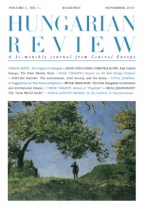THE VANISHING TWENTY YEARS - East Central Europe: the Next Twenty Years
THE VANISHING TWENTY YEARS - East Central Europe: the Next Twenty Years
Author(s): Dimitrij RupelSubject(s): Politics / Political Sciences
Published by: BL Nonprofit Kft
Summary/Abstract: History does not change every day. European history used to be divided into “ages” and “centuries”, but also into “reigns” and “regimes” – meaning the periods of individual historically important monarchs or political leaders. With the “present day” acceleration of history, standards of change have shrunk. Do we measure historical change by elections and political mandates? Which countries should be taken into consideration? Austria, Austria-Hungary, France, Russia, Slovenia, Soviet Union, United Kingdom, United States or Yugoslavia? Emperor Franz Joseph I ruled Austria almost 68 years (1848–1916). Some American presidencies, e.g. the Roosevelt (1933–1945), the Kennedy (1961–1963) or the Reagan presidency (1981–1989) have characterized American life in a profoundly meaningful way – regardless of the time spent in office. We can also talk about the Winston Churchill era (1940–1945, 1951–1955), the Charles de Gaulle (1959–1969), Helmut Kohl (1982–1998), Margaret Thatcher (1979–1990) or Tony Blair era (1997–2007). On the other hand, the “bad” Soviet Union is synonymous with the exceptionally long rule of Joseph Stalin (1922–1953), while the “good” Soviet Union is identified with the short rule of Mikhail Gorbachev (1985–1991). We often describe the time when Josip Broz Tito ruled Yugoslavia as Tito’s era (1945–1980). We talk about a Kennedy or a Gorbachev era irrespective of the number of years spent in office. On the other hand, Tito’s or Stalin’s era each lasted more than thirty years. So, history does not necessarily change every four years! Does it change every new generation – meaning four times in a century? How long are the steps, how lasting the historical achievements? Of course, everything depends on the definition. Philip Bobbitt has argued that WW I ended only in 1989. Such generous standards probably could not help the purpose of this paper.
Journal: Hungarian Review
- Issue Year: I/2010
- Issue No: 01
- Page Range: 12-16
- Page Count: 5
- Language: English

